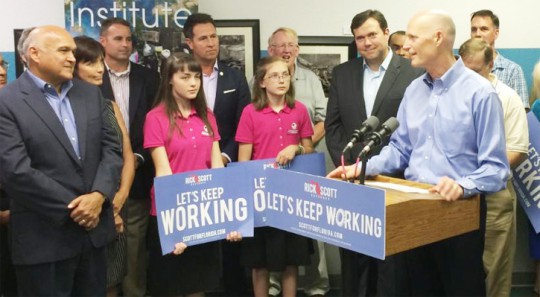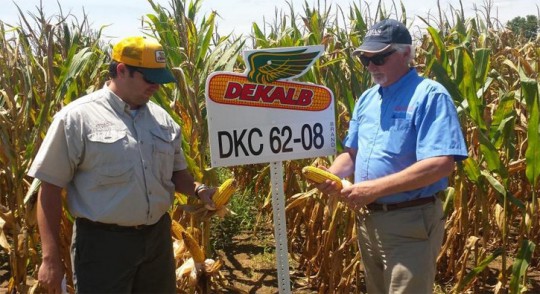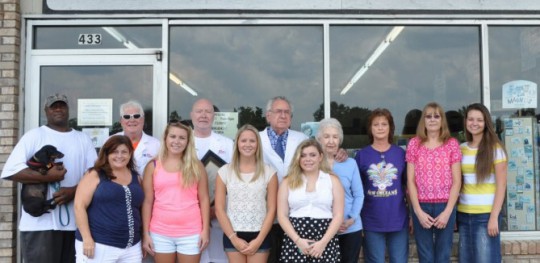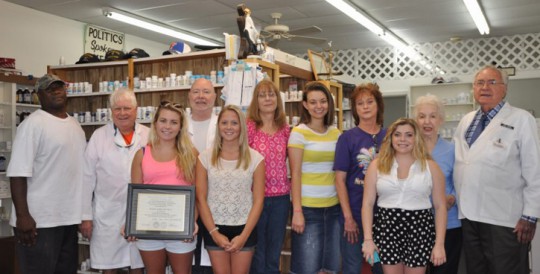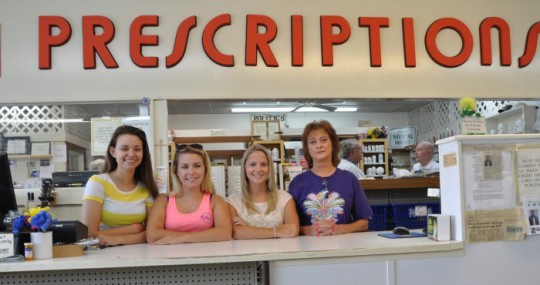How Much Money Are Your Lawmakers Worth?
July 30, 2014
For most state lawmakers, 2013 was another good year financially, regardless of party.
 Still, those with an “R” affixed to their names are doing better, in general, when it comes to the bottom line thanks mostly to stronger housing and stock markets.
Still, those with an “R” affixed to their names are doing better, in general, when it comes to the bottom line thanks mostly to stronger housing and stock markets.
Updated financial-disclosure reports for 2013 were due July 1. And from the reports posted online, the average net worth in the Senate is just under $3.77 million, while the average net-worth figure is a little more than $1.4 million in the House.
Among local members of the legislature:
- Greg Evers, R-Baker listed a net worth of $1,219,469. He reported income from his senate job and his farm in Okaloosa County. His assets include mostly real estate related to his residence and farm, and farm related equipment, while most of his liabilities were payable on bank loans.
- Clay Ingram, R-Pensacola listed a net worth of $18,807. His only listed income was his legislative job. His assets included a home in Pensacola, while his primary liability was his mortgage.
- Mike Hill, R-Pensacola listed a net worth of $1,273,991. His primary income was from his State Farm insurance agency and his legislative post. His primary assets listed included his home, rental properties, insurancy agency property and investments. His primary liabilities were bank notes.
The totals run from a high of $26 million for outgoing Senate President Don Gaetz to a negative $127,138 for Rep. Darryl Rouson, a St. Petersburg Democrat who remains underwater on a pair of home loans.
Gaetz, a Niceville Republican with two years remaining in the Senate, was a co-founder of VITAS Healthcare Corp. He actually saw his net worth slip slightly in 2013, by about $140,000, from the prior year.
“The decline in my net worth is forcing me to make economies,” Gaetz quipped in an email response. “I’m afraid I will have to cancel some newspaper subscriptions.”
Of the 156 lawmakers who served during both the 2012 and 2013 sessions and whose reports were available, 119 recorded increases in net worth, 35 went down and two posted no change.
The reports represent an individual’s net worth on Dec. 31, 2013. While the reports were due July 1, lawmakers have until Sept. 2 to file them before facing fines.
As of Dec. 31, 2012, the average for all 40 senators stood at $3.34 million. The average for the 120 House members was $1.27 million.
A little more than $30,000 in income for each legislator comes from their state salaries.
Senate Republicans on average are worth $4.3 million per the latest reports, while their House GOP counterparts chime in at an average of $1.7 million. Democrats in the Senate averaged $2.77 million, while in the House the average stands at $865,224.
Of the 40 Senators, 18 are millionaires, one more than during the prior year. In the House, 35 of the 120 members are members of the millionaires club, the same number as the previous year though the list of millionaires does not include all the same representatives.
In the House, 12 members — two fewer than a year earlier — owe more than they’re worth, mostly due to outstanding home, student and auto loans.
by Jim Turner, The News Service of Florida
Seniors Can Earn Income As Foster Grandparents, Senior Companions
July 30, 2014
The Council on Aging of West Florida is seeking individuals 55 and older in Escambia and Santa Rosa Counties who are interested in earning a tax-free stipend and additional benefits while sharing their wisdom, time and talents as a participant in its Foster Grandparent and Senior Companion programs.
 Benefits include: a monthly stipend set by federal guidelines at $2.65 per hour; an annual physical; transportation provided or reimbursed at .445 cents per mile; insurance coverage for on-the-job injuries, and on-going training.
Benefits include: a monthly stipend set by federal guidelines at $2.65 per hour; an annual physical; transportation provided or reimbursed at .445 cents per mile; insurance coverage for on-the-job injuries, and on-going training.
Opportunities are available to both men and women. To qualify for participation, individuals must: be age 55 or older; earn an annual income of no more than 200% above federal poverty guidelines; possess a sincere ability to work with others; be physically capable of working a minimum of 20 hours per week, and pass required background screenings. Bilingual participants are encouraged to enroll in both programs.
Foster grandparents work with children in schools, HeadStart programs and child care centers. Activities may include helping with classwork, reinforcing values and caring for children with disabilities. Foster grandparents generally work four hours per day, Monday through Friday.
Senior companions help their less mobile peers live independently in their own homes by providing friendship and assistance. Activities may include helping with meals, socialization and providing respite to family caregivers.
The Foster Grandparent and Senior Companion programs are national programs of Senior Corps, funded by the Corporation for National and Community Service. The programs are sponsored in Escambia and Santa Rosa Counties by Council on Aging of West Florida. For more information, please call Robin Stevens at (850) 432-1475 ext. 605 or visit www.coawfla.org.
Scott Visits Escambia Tech Company With 120 New Jobs
July 30, 2014
Gov. Rick Scott visited an Escambia County technology company Tuesday that plans to bring about 120 new jobs to the area.
Scott talked about his plans to create more jobs for Florida at Global Business Solutions, an internet and technology training company on Michagan Avenue.
“In order for Florida to remain a global hub for business, we have to make sure advanced industries are able to thrive and continue to create jobs and diversify our economy. That means developing a well-educated workforce, eliminating roadblocks for job creators and investing in our research institutions. Florida has come a long way, but we have a long way to go – and focusing on jobs for the next generation will ensure that we continue to create long-lasting, high-wage, more resilient careers,” Scott said.
The stop was part of Scott’s “Jobs for the Next Generation” tour, with Scott highlighting new proposals to permanently end sales tax on manufacturing equipment and reward the state’s best STEM (science, technology, engineering and mathematics) teachers with summer residencies at private sector companies.
Pictured: Gov. Rick Scott speaks Tuesday afternoon at Global Business Solutions in Escambia County. Courtesy photo for NorthEscambia.com, click to enlarge.
Mississippi Downs Blue Wahoos
July 30, 2014
The Pensacola Blue Wahoos dropped their fourth straight to the Mississippi Braves, 4-3, on Tuesday night at Trustmark Park in Pearl, Miss. Robert Stephenson (L, 5-7) was plagued by seven walks over his 4.2 innings of work despite striking out six Braves hitters.
 Mississippi scored their first run on a passed ball to match the Blue Wahoos first-inning run and tie the game early. Pensacola re-claimed the lead with a run in the third when Ryan Wright scored from second on a hustle double into shallow centerfield by Travis Mattair.
Mississippi scored their first run on a passed ball to match the Blue Wahoos first-inning run and tie the game early. Pensacola re-claimed the lead with a run in the third when Ryan Wright scored from second on a hustle double into shallow centerfield by Travis Mattair.
The Braves did the lion’s share of their damage in the fifth. Robert Stephenson fought his control with three walks in the fifth inning and he allowed just one single before exiting with the bases loaded and two outs and the game tied at two. James Walczak allowed a single to the first batter he faced, Braeden Schlehuber, which scored two runs and gave the Braves all they needed.
Stephenson allowed 4 R/3 ER over his 4.2 inning and matched his season high with seven walks to go with six strikeouts. He surrendered just three hits in the losing effort.
Braves starter Ryan Weber (W, 4-4) picked up the win after allowing just 3 R/ER on eight hits over 6.0 innings. Ryan Kelly (S, 2)came in to work a scoreless ninth for his second save of the year.
The Blue Wahoos will try to stop the skid on Wednesday with RHP Michael Lorenzen (4-5, 2.70) on the mound against Braves RHP Mitch Atkins (5-0, 4.65). First pitch is slated for 7:00 p.m. from Trustmark Park.
by Tommy Thrall
Field Corn Variety Tour Held
July 30, 2014
 A Field Corn Variety Tour was held Tuesday at the UF/IFAS West Florida Research and Education Center near Jay.
A Field Corn Variety Tour was held Tuesday at the UF/IFAS West Florida Research and Education Center near Jay.
During the tour, producers and ag officials from across the region had a chance to learn about about 20 different varieties of corn, including heirloom varieties, plus crop and weed management. The event was a joint project of UF/IFAS, the Alabama Cooperative Extension Service, and Escambia and Santa Rosa counties.
Pictured top and bottom: The Field Corn Variety Tour Tuesday at the UF/IFAS West Florida Research and Education Center near Jay. Pictured inset: A tall heirloom variety of corn. Photos for NorthEscambia.com, click to enlarge.
No Injuries In Cantonment Intersection Crash
July 29, 2014
There were no injuries in a two-vehicle accident Tuesday morning in the intersection of Highway 29 and Muscogree Road. Everyone involved in the 9:45 a.m. crash refused medical treatment. The Cantonment Station of Escambia Fire Rescue and the Florida Highway Patrol responded to the crash. NorthEscambia.com photo by Ramona Preston, click to enlarge.
Cantonment Pharmacy Closes After 41 Years, Millions Of Prescriptions And A Few Marriages
July 29, 2014
The employees at Cantonment Pharmacy gathered one last time. They shared a few laughs and a lot of tears as they covered the windows with paper and posted a closure notice. The employees, the family, of Cantonment Pharmacy posed for a few photos before saying goodbye. Then, with the turn of the front door lock, a big piece of Cantonment faded into the history books.
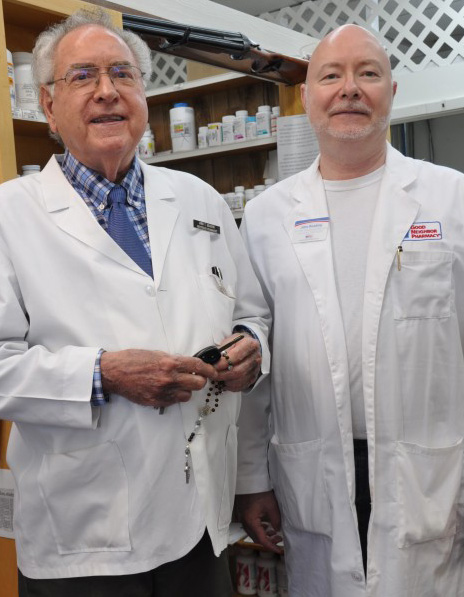 Pharmacist John Reading said the decision to close the landmark business after 41 years and millions of prescriptions filled was not an easy one, but necessary. The business, he said, was sold to Winn Dixie, with customer records transferred to their Cantonment store.
Pharmacist John Reading said the decision to close the landmark business after 41 years and millions of prescriptions filled was not an easy one, but necessary. The business, he said, was sold to Winn Dixie, with customer records transferred to their Cantonment store.
“It all came down to the economy, insurance and the big chain stores,” Reading said. “The little guys are just being squeezed out of business.” Small pharmacies, he said, often receive a lower reimbursement rate that big chain stores, and legislation signed by Gov. Rick Scott will only make the problem worse next month.
“We sold to Winn Dixie after they made a fair offer. They are fairly close for our customers, have a fair price and our pharmacies have worked together for years. It was just the best thing for us to do right now.”
“I’m going to miss seeing the people and the families I’ve know for three or four generations. I even performed marriages for a few of them as a notary,” Reading said. “We know the people so well…..we love them.”
Pictured: The employees of Cantonment Pharmacy gathered one last time as the business was closed and sold to Winn Dixie. Photos for NorthEscambia.com, click to enlarge.
Poll: Overwhelming Support For Medical Marijuana In Florida
July 29, 2014
Young and old Floridians overwhelmingly support letting sick patients get high for medical reasons, according to the latest poll on the issue, but getting voters to put medical marijuana into the state constitution is still not a guarantee.
 A poll released Monday found that almost 90 percent of Florida voters want doctors to be able to order marijuana for patients. The poll by Quinnipiac University found widespread support for medical marijuana. Eighty-eight percent of Florida voters — including 83 percent of voters age 65 and older and 95 percent of those between 18 and 29 — approve of medical marijuana
A poll released Monday found that almost 90 percent of Florida voters want doctors to be able to order marijuana for patients. The poll by Quinnipiac University found widespread support for medical marijuana. Eighty-eight percent of Florida voters — including 83 percent of voters age 65 and older and 95 percent of those between 18 and 29 — approve of medical marijuana
“Even though a proposal to legalize medical marijuana, on the ballot this November, must meet a 60 percent threshold, these numbers make a strong bet the referendum is likely to pass,” Peter Brown, assistant director of the Quinnipiac University poll, said in a prepared statement accompanying the results.
But even supporters of the proposed constitutional amendment acknowledged that the poll results may overestimate Floridians’ support.
“The poll is just another demonstration that support for this is broad,” said Ben Pollara, executive director of United We Care, the group responsible for getting the proposal on the November ballot and working to get it passed.
The poll shows “that the vast majority of Floridians support the general concept of medical marijuana,” Pollara said.
Critics of the proposal, who’ve pumped at least $3 million into efforts to kill it and are prepared to spend more, blasted the semantics of the poll, as well as its findings. The proposal that will appear before voters in November, bankrolled by Orlando trial lawyer John Morgan, would allow doctors to decide whether patients who have debilitating medical conditions could receive medical marijuana. Doctors could not “prescribe” the substance, which would be distributed by state-licensed operators.
“This poll has been, and continues to be, a complete outlier in support of medical marijuana because it asks a question that won’t be on the ballot. Amendment 2 doesn’t require a doctor’s prescription,” said Sarah Bascom, spokeswoman for the “Vote No on 2″ campaign.
Connecticut-based Quinnipiac University, which frequently conducts polls in Florida and other states, found bipartisan support for legalizing medical marijuana, with an 80-19 percent split among Republicans — whose level of support was the lowest of any subgroup.
“Forget the stereotypes of stodgy old folks living out their golden years playing canasta and golf,” Brown said. “Almost nine in 10 Floridians favor legalizing medical marijuana and a small majority says adults should be able to possess small amounts of the drug for recreational purposes.”
The groundswell of support, mirrored in other polls, gave cause for cheer to backers of the proposed constitutional amendment. Experts estimate that both campaigns might spend up to $20 million on the issue.
“This poll clearly shows that the disingenuous arguments being put forth by organizations like Drug Free Florida and the Florida Sheriffs Association are not fooling Florida’s voters,” Pollara said. “Floridians understand this is an issue of compassion, and they are ready to put these kinds of health care decisions where they belong: in the hands of patients and their doctors, not politicians.”
Opponents are likely to rely on polling showing weakened support for the issue when linked to adolescents’ use of medical marijuana.
GOP legislative leaders and other Republicans who oppose legalization of medical marijuana signed off this spring on a form of marijuana that purportedly does not get users high but is believed to relieve seizures in children with a rare form of epilepsy. The Department of Health is in the process of creating rules for the new law, which authorizes strains of marijuana that are low in euphoria-inducing tetrahydrocannabinol, or THC, and high in cannabadiol, or CBD. The law also allows patients who suffer from severe muscle spasms or cancer to be put on a “compassionate use registry” for the low-THC product as long as their doctors approve.
Under the law, doctors who order the substance for their patients must also file their treatment plans with the University of Florida pharmacy school. The university would also be eligible for $1 million in grants to study the efficacy of the low-THC treatment for children with severe forms of epilepsy.
But university officials say that participating in that research could cost them millions more in federal grants for other programs.
“Federal law prohibits possession, cultivation, manufacturing and distribution of marijuana. Violating federal law threatens the federal funding UF receives. As a state agency, UF is required to comply with the law. An outside counsel review of the laws reached the same conclusion,” University of Florida spokeswoman Janine Sikes said Monday.
The university may in the future find a researcher who could evaluate the effectiveness of the low-THC, Sikes said in an e-mail.
That research would only pertain to “outcomes measurement of patient care — not a drug or plant study,” Sikes said.
Rep. Katie Edwards, a Plantation Democrat who has gathered reams of research on the topic and was instrumental in passage of the low-THC legislation, had hoped that the University of Florida would be the conduit into the state for medical marijuana. She said she was disappointed in the university’s position but remained hopeful “that another entity that fits the criteria laid out in the statute will step up and assist the many patients who are desperately seeking this treatment.”
The Department of Health is holding a second rule-making workshop on the low-THC issue Friday in Tallahassee.
Edwards, like others, remains concerned that federal laws making marijuana illegal could pose problems getting the substance into the state to kick-start the low-THC program.
“Very quietly,” Rep. Matt Gaetz, a Fort Walton Beach Republican lawyer who sponsored the legislation, said at the last rule-making workshop when asked how authorized growers will obtain seeds or plants. “But I know a few parents of children with intractable epilepsy who will be happy to go get it for you.”
But Edwards, also a lawyer, indicated that the state needs to come up with a better plan.
“I would never counsel a client to break the law and turn a blind eye,” Edwards. “That’s why I’m trying to find a solution that will work.
The poll released Monday also showed that Florida voters support allowing recreational marijuana by a 55 percent to 41 percent margin, but men and women are split on the issue, the poll found. Men support allowing Floridians “to legally possess small amounts of marijuana for personal use” by 61 percent to 36 percent while women are more skeptical, with 49 percent approving and 45 percent opposed. Young voters support the idea by a 72 percent to 25 percent margin, while voters 65 and older are opposed by a margin of 59 percent to 36 percent.
Seventy-one percent of voters also would support having a medical marijuana dispensary in the town where they live. The lowest level of support for having a dispensary in their neighborhoods comes from voters over age 65, with 57 percent in favor and 37 percent opposed.
“No ‘Not in My Backyard’ mentality here. By an almost 3-to-1 majority, Florida voters would allow a medical marijuana dispensary near where they live,” Brown said.
And the poll found that 44 percent of Florida voters say they have tried pot, including 51 percent of men, 39 percent of women and 48 percent of voters ages 18 to 29. Just 23 percent of voters over 65 say they’ve tried marijuana.
The poll was conducted from July 17 to July 21. It surveyed 1,251 registered Florida voters with a margin of error of 2.8 percentage points.
by Dara Kim, The News Service of Florida
Local Forest Service Firefighters Deployed To Fight Western US Fires
July 29, 2014
Local area firefighters are among dozens being sent from the Florida Forest Service to help battle blazes in the western United States.
 There are six Florida Forest Service firefighters from the Blackwater District — which includes Escambia and Santa Rosa counties — that have been been deployed so far to various western states, according to Joe Zwierzchowski, spokesman.
There are six Florida Forest Service firefighters from the Blackwater District — which includes Escambia and Santa Rosa counties — that have been been deployed so far to various western states, according to Joe Zwierzchowski, spokesman.
So far this season, the Florida Forest Service has deployed 52 wildland firefighters to western wildfires, including Oregon’s 396,000-acre Pine Creek wildfire and Washington’s 250,000-acre Carlton Complex of wildfires.
“The Florida Forest Service will continue to fill requests for help as we receive them,” said Jim Karels, State Forester. “The experiences that our firefighters gain out West will build upon their first-class training and experience fighting wildfires here in Florida.”
Deployed wildland firefighters will fill a variety of roles, including front-line firefighting, aviation, safety regulation, logging, heavy equipment management and more.
“The Florida Forest Service is a talented group of some of the most skilled firefighters in the country,” said Florida Commissioner of Agriculture Adam H. Putnam. “Thanks to current low wildfire danger levels in Florida, we are able to lend support to other states for the protection of people, structures and natural resources.”
12 Elementary Schools To Add Extra Hour Due To Low Reading Scores
July 29, 2014
Due to low reading scores, a dozen Escambia County elementary schools will have an extended school day when classes begin next month.
 The extra hour per day was mandated by the State of Florida for the 300 lowest scoring elementary schools. Students will spend the extra time each day working on reading and comprehension skills.
The extra hour per day was mandated by the State of Florida for the 300 lowest scoring elementary schools. Students will spend the extra time each day working on reading and comprehension skills.
The extra hour was mandated for Ensley Elementary, Holm Elementary, Montclair Elementary, Myrtle Grove Elementary, Navy Point Elementary, Oakcrest Elementary, O.J. Semmes Elementary, Sherwood Elementary, Warrington Elementary, West Pensacola Elementary, C. A. Weis Elementary and the Global Learning Academy.
None of the elementary schools in North Escambia or District 5 will be required to have the extra hour, and for those schools it will be the normal school day when classes begin August 18.


